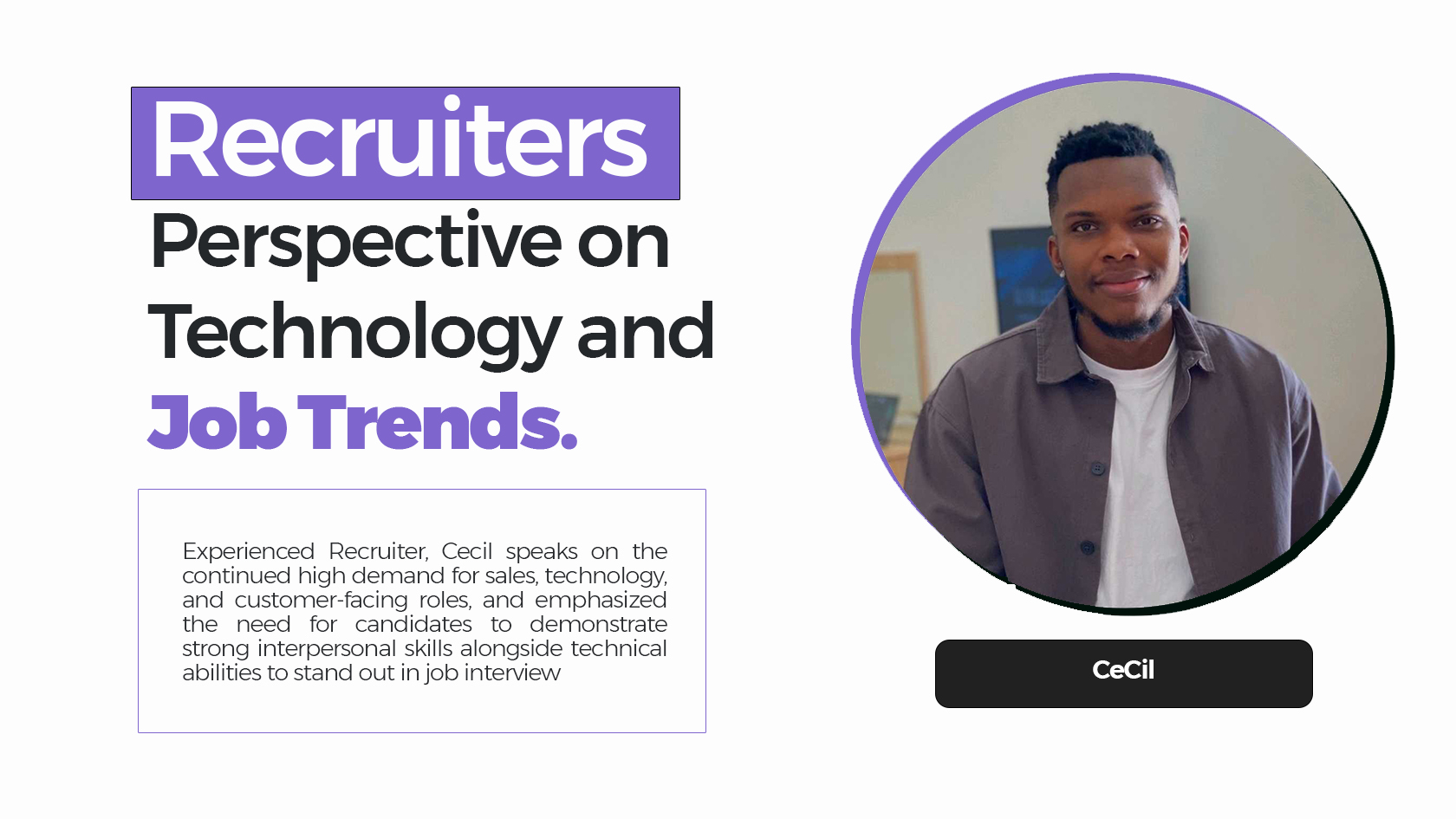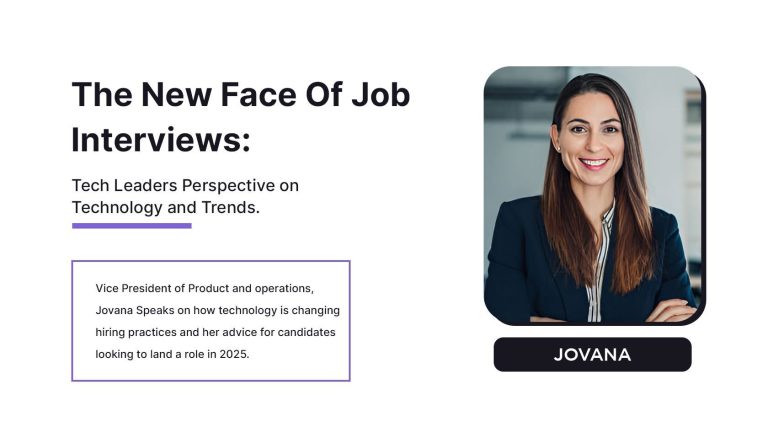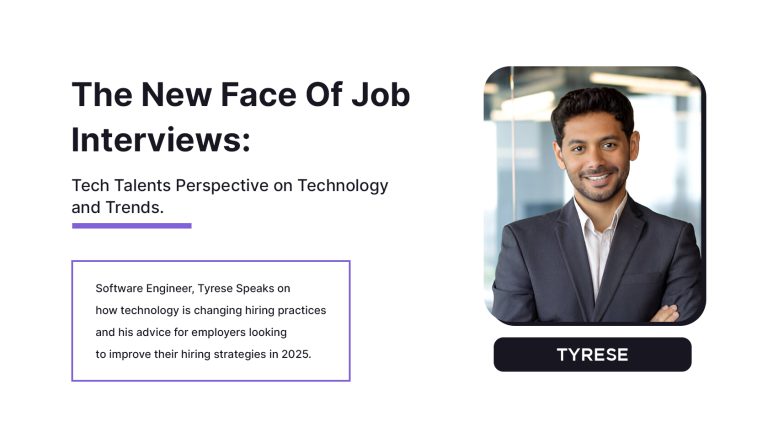Recruitment is transforming technology reshapes the workplace. Artificial Intelligence (AI) is streamlining processes and enhancing efficiency, but it also presents new challenges and opportunities for recruiters. To stay competitive, recruiters must adapt to skills and leverage the right hiring tools.
We spoke with Cecil Chimo Beam Ezemaka, a recruiter with experience across diverse industries and countries. Cecil shares his insights on how AI is impacting talent acquisition. The challenges he faces during interviews, and his vision for solutions in 2025. He also offers invaluable advice for job seekers and aspiring recruiters.
Cecil’s Journey from Civil Engineering to Recruiting
Cecil Chimo Beam Ezemaka never planned to become a recruiter. As the son of a renowned civil engineer in Nigeria. He followed in his father’s footsteps and studied civil engineering at the University of Nigeria, Nsukka. But after graduating, Cecil realized that civil engineering wasn’t his true passion.
“After I left NYSC camp last year, I figured out that this wasn’t actually what I wanted,” Cecil shares. “So I decided to try out some other opportunities.”
A chance encounter with an experienced recruiter friend set Cecil on a new career path. The friend laid a foundation for Cecil in the recruiting field. Cecil soon landed his first gig with a U.S. insurance company that required his services one day per week.
“I did that for three months and saw, okay, this is very cool,” Cecil says. “This is something I can do.”
Cecil jumped into recruiting full-time, applying to more positions, and getting invites and referrals based on his early work. He discovered a passion for connecting people with opportunities and helping startups build out their teams to scale their businesses.
“Currently, one of my insurance partners that I’ve worked with for the past year has been able to scale their business a lot since signing a contract with them in September 2022,” Cecil explains proudly. “They were recently listed as one of the 5,000 best-performing businesses under Forbes in the U.S. These are the things that give me very good job satisfaction working as a recruiter.”
Transition and Challenges
Cecil’s transition into recruiting happened somewhat unexpectedly. It wasn’t a long-planned move after graduation, he realized shortly after the NYSC camp that civil engineering wasn’t his calling.
“I wasn’t interested in doing the NYSC,” Cecil admits. “I just did it again for this Nigerian setting. You have to go to camp. You have to just show something that you’ve graduated so that your parents can be proud of it or something.”
It was a chance conversation with a recruiter friend after leaving camp that piqued Cecil’s interest in the field. He was drawn to the idea that recruiting was a career path that didn’t necessarily require highly technical skills. Instead, it required strong communication and team management abilities. These were areas where Cecil already excelled.
However, the transition wasn’t without its challenges and uncertainties. One of Cecil’s biggest fears was the interviewing aspect of recruiting.
Having to sit for interviews scared me a lot because I didn’t have any skill in this,” Cecil shares candidly. “There was no way for me to defend myself or try to get jobs. Unsure of what to say, I couldn’t win over employers to hire me for these different roles.”
To build his interviewing confidence, Cecil immersed himself in studying the craft and watching many interviews to learn effective techniques. Over time, he developed into a skilled interviewer in his own right; a critical part of success as a recruiter.
“If someone is going to be hiring you as a recruiter, you need to ace your interview skills,” Cecil emphasizes. “I mean, you can’t be interviewing someone when you also don’t know how to sit for interviews. It’s one of the key skills in being a recruiter – you need to have expert interviewing skills.”
Beyond interviewing prowess, Cecil pinpoints the ability to spot top talent as another essential skill for recruiters. Being capable of quickly recognizing standout candidates from a sea of resumes and portfolios is crucial.
Assessing Culture Fit as a Recruiter
“The first thing about culture fit is you also need to be a part of the company that you’re currently hiring for,” Cecil explains. “You’re the one that will identify how their cultural fit is.”
Cecil emphasizes the importance of immersing oneself in the company’s culture. This is done through interactions with the CEO, co-founders, or hiring managers during the recruiting process. Another way is by talking to current and past employees. These conversations offer valuable insights into the work setting, communication styles, and values that define an organization’s culture.
“There are very different people who will be applying to your position,” Cecil notes. “Some of them might be very qualified for the role, but they will lack the cultural fit. Maybe their communication skill might not be very great, or they might have some integrity issues.”
Cecil illustrates this point with an example from his own experience. He was recruiting for a challenging client. This client was a “tough guy” who owned an aircraft leasing company in Barcelona. The client’s micromanaging tendencies and demanding communication style made finding suitable candidates a delicate balancing act.
“When I was recruiting for this kind of person, I had to portray that kind of person that he was to these candidates,” Cecil shares. “I had to see the best person that could maybe compromise a little on having to manage that part of him.”
Assessing culture fit, Cecil believes, is a skill honed through experience and intuition rather than a formulaic process. It requires a deep understanding of both the company and the candidate. One must identify alignments or mismatches in work styles, values, and communication preferences.
Interestingly, Cecil has also observed cultural patterns across candidates from different countries, which can inform the recruiting process.
“Across different countries, people behave kind of similar,” he notes. “If you’re hiring from Pakistan, you should expect some particular traits. If you’re hiring from India or the Philippines, you should expect some particular traits from these people. This is like their way of life.”
Understanding these cultural nuances can help recruiters identify the talent pools most likely to align with a company’s specific culture. Cecil suggests this alignment can also meet the company’s specific needs.
Cecil’s Insights on In-Demand Skills and Tools
For Cecil, LinkedIn serves as the primary tool for attracting and screening candidates. “LinkedIn is like my 100% tool that I use to attract candidates,” he shares. “Most of the roles I’m currently hiring for are all headhunting roles. So I just like to scan through my LinkedIn Recruiter, put in the necessary filters to bring out profiles that are currently hiring for.”
Cecil’s approach involves meticulously reviewing profiles to identify the best fit for each role. When a promising candidate emerges, he saves them as a lead. He might also add them to his current pipeline on LinkedIn Recruiter. This streamlined system allows him to organize and track potential hires effectively.
Cecil has experimented with applicant tracking systems (ATS) like Jazz HR and Trackstar in the past. He found the costs prohibitive for his needs. “I try to cut down on those expenses just to increase my profits,” he explains. By focusing on LinkedIn as his primary sourcing tool, Cecil has found a cost-effective way to connect with top talent.
The Most In-Demand Skills: From Sales to Tech and Beyond
1. Sales and Marketing: “Every company in the US is looking to make sales.” They aim to drive their profits up,” Cecil notes. Roles like VP of Sales, Director of Sales, Sales Executive, and Sales Representative are consistently in high demand. These roles are needed across industries like insurance, tax services, software, and real estate.
2. Technical Skills: Software engineers, quality assurance engineers, and compliance officers remain sought-after. Cecil acknowledges the impact of AI on job reduction in these fields. “You need to be an expert in your field. Only then you be able to secure a role that might be permanent,” he advises.
3. Healthcare Professions: Cecil tends to avoid recruiting in the healthcare sector due to the abundance of opportunities and competition. He recognizes that healthcare professionals are consistently in demand.
4. Writing and Content Creation: Copywriters, creative writers, and content writers are highly sought after. They are in demand by companies, content agencies, and blogs.
The AI Breakthrough in Recruiting
Cecil recognizes the immense potential of AI in revolutionizing recruiting. “AI has helped a lot, to be honest,” he says. “Most of my tools, just like on LinkedIn, LinkedIn is already incorporating AI into their various operations on their platform.”
AI-powered tools assist recruiters in generating profiles based on given prompts. They help in developing job descriptions, sorting applicants, and even handling follow-ups and conversational messages. This automation streamlines the recruitment process, enabling recruiters to focus on higher-level tasks and candidate engagement.
Nonetheless, Cecil also acknowledges the limitations of AI in certain aspects of interviewing. “Some questions might be personal. Some questions might be on the spot. AI tools might not be able to handle that other part of it,” he notes. While AI can handle structured interviews, the human touch remains essential for navigating nuanced and personalized interactions.
Interview Challenges and Solutions
1. Internet Connectivity: Poor internet connection on either the recruiter’s or the candidate’s side can disrupt the flow. It can also affect the mood of the interview. “Once that kind of back and forth starts coming in, it just sets the mood of the interview,” Cecil explains.
2. Note-Taking: Balancing active listening and note-taking during interviews can be challenging. Cecil has incorporated various note-taking applications to capture key points without losing focus on the conversation.
3. Candidates Not Meeting Requirements: Some candidates may misrepresent their qualifications on resumes or job applications. Cecil has developed a keen intuition to assess a candidate’s fit within the first minute of the conversation. However, he still has to proceed with the interview and provide a respectful rejection later.
Looking Ahead to 2025
1. Improved AI Integration: AI will become more sophisticated. It will handle a wider range of interview questions. It will also adapt to individual candidate needs. This will free up recruiters to focus on building genuine connections and assessing cultural fit.
2. Enhanced Virtual Interview Platforms: Virtual interview platforms will offer stable, high-quality video and audio to minimize connectivity issues. Features like automatic transcription and real-time analysis will streamline the interview process.
3. Skill Verification Tools: Advanced skill assessment and verification tools will help recruiters identify candidates who truly meet the requirements. This reduces time spent on mismatched interviews.
4. Personalized Candidate Experiences: AI-powered chatbots and personalized communication will provide candidates with instant feedback, updates, and resources throughout the hiring journey. This will improve the overall candidate experience.
Cecil’s Insights for Job Seekers and Aspiring Recruiters:
Be Honest and Authentic
One of the most critical pieces of advice Cecil offers is the importance of honesty and authenticity in the job search process. He emphasizes that candidates should only apply for positions they are genuinely qualified for and can excel in.
“Be sure that you are a good fit for that position,” Cecil stresses. “Look for jobs that match your skill sets. Also, seek jobs where you feel you’ll stand out among all other applicants.”
Misrepresenting qualifications or experience on a resume or during an interview may lead to short-term gains. However, it can have long-term consequences. Recruiters like Cecil have a keen eye for identifying skill discrepancies. When a candidate’s skills don’t align with their claims, it leads to awkward interviews and swift rejections.
Tailor Your Application
In a sea of applicants, how can job seekers make their profiles stand out? Cecil recommends tailoring resumes and portfolios to fit the specific requirements of each job listing.
“When you apply to a job, it is very, very important that you go back and tailor whatever portfolio that you have, whatever resume that you have, whatever platform that you’re currently applying from, to fit that exact job that you’re currently applying for,” he advises.
For example, if applying for a recruitment role focused on the sales industry, candidates should highlight their experience in sales. They should also mention any successful sales hires they’ve made in the past. This targeted approach demonstrates a deep understanding of the role and increases the likelihood of catching the employer’s attention.
Be Proactive and Alert
In the fast-paced world of recruitment, timing is everything. Cecil encourages job seekers to be proactive and alert. They should monitor job listing websites closely and set up notifications for relevant positions.
“The earlier you apply to a position, the better. The faster you apply, the sooner you might be waiting to get a reply,” he explains. “Most serious employers will always start checking their application pool from when they have posted the jobs.”
By being among the first applicants, candidates increase their visibility and chances of being considered for the role. This proactive approach also demonstrates enthusiasm and commitment, qualities that recruiters and employers highly value.
Advice for Aspiring Recruiters
For those looking to break into the recruitment field, Cecil’s advice is simple. Develop a deep understanding of the industries and roles you’ll be recruiting for. Aspiring recruiters should immerse themselves in industry trends, job requirements, and candidate expectations.
Networking is also crucial. Building relationships with professionals across various fields can provide valuable insights and help identify top talent. Attend industry events, join relevant online communities, and engage with thought leaders to expand your knowledge and network.
Finally, Cecil emphasizes the importance of empathy and communication skills. Recruiters are the bridge between candidates and employers. The ability to listen, understand, and communicate effectively is essential for success in this role.




